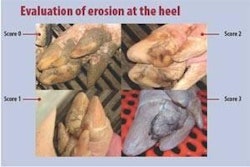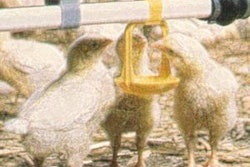Times are tough. We have been through a crisis of record-high feed ingredient prices only to enter a difficulty of bank credit restrictions and to see the prospect of an economic recession upsetting the demand for our meat. Against such a background, it was a particular pleasure for me to talk recently to two young cousins who have made commercial pork production their career choice.
On my evening visit, we talked sitting around a table at the farmhouse, on which the mother of the farming family had placed a delicious array of foods to savour. These cousins are very much the next generation of the family enterprise and the talk showed they are convinced that the farm is right to continue its focus on pork.
They are comparatively young but do not call them newcomers to the world of producing pigs. Through their experience of working in the family business and at other farms as part of their technical training, they know all about the problems — the daily challenge of converting a diversity of raw materials into a product that is both reliable and affordable, the constant struggle to find and then to retain skilled workers, and the endless battle to secure a fair price for the meat produced. Far from being gloomy about such matters and about the current environment of costs and prices, however, they have remained remarkably upbeat.
As bright and educated people who understand very well the realities of producing pigs commercially in the new millennium, they insist that commercial pig production still has much to offer to the young. Forget that working with pigs sometimes has a poor image when mentioned to anyone outside farming, they insist. Put aside the competition from other industries that might have been able to pay higher wages for easier work. Remember instead that the world has millions of mouths to feed and that the world likes pork.
In fact, they reminded everyone sitting around that farmhouse table that pork holds an impregnable place as the world's number one meat. Pigmeat accounts for about 4kg out of every 10kg of meats eaten globally each year. That compares with less than 3kg for poultry meat. The other 3kg is composed of a mixture of beef, veal and the remaining meat types.
Now view this popularity alongside the projections made for the growth in the global human population, the cousins added. The number of people passed the 6 billion mark around the turn of the century and has already climbed to almost 6.9 billion in the following years. There is an undeniable need for more meat with which to feed them all.
Distinguishable in the marketplace
A second compelling reason for optimism, in their view, lies in the necessity that the meat producer must compete. In any industry, they declared, there will always be a place for the producer of an exceptional product. The key factor therefore is to avoid producing only a basic commodity and instead to focus on being distinguishable in terms of description, quality and consistency. The cousins have dedicated themselves to investing in the development of their enterprise to guarantee a top-class product at the right production cost.
There could be no doubting their determination when I met them that evening. As we enjoyed the food placed before us, it was uplifting to hear them express such a firm belief in the future of pork production and in their place in it going forward.
Often at present it feels as if we are in the middle of a guessing game. We have to guess how the financial and economic gloom in many parts of the world is likely to affect our marketplace.
History teaches us that economic well-being and meat consumption go hand in hand. The more affluent people are in terms of their disposable income, the more they will choose to eat animal protein and the more meat they will consume. Presumably, therefore, the reverse applies and a recession of national economies will bring less demand.
Many economists, consultants or crystal-ball gazers have arrived at exactly that conclusion. They define a recession as occurring when a country's economy undergoes zero or minus growth in at least three successive reporting periods. A number of countries are in or approaching a recessionary time by that yardstick. Most expect the fallout to be evident in 2009.
But it is only guesswork how deep this will go and also how long it will last. The sequence from poor bank loans to instability in the banking sector happened rapidly and the descent from there into a credit squeeze and lack of spending power has also been quick. The experts say maybe the recovery to a more normal situation will be equally rapid.
We do know even now that the supply of pork and of competing meats has already been adjusted in anticipation of a drop in demand in the main international markets. Therefore, the impact on the price received by producers should be muted.
What we do not want in this situation is for the world price of oil to shoot back up so that ethanol generation is promoted and less grain is therefore available for feed use.
It is inexcusable that food production remains at the mercy of grain prices which are manipulated by political support for green energy projects.

















